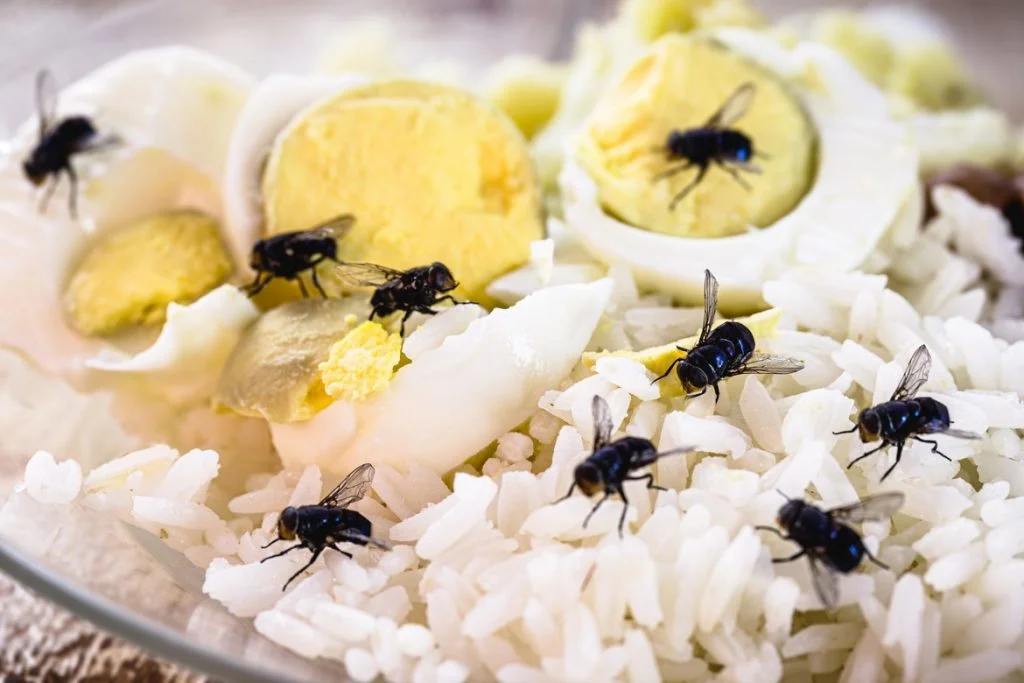So, you’ve found yourself in a situation that many homeowners dread: a fly infestation. Therefore, it’s time to call House Flies exterminators. Why’s that? It’s because these winged pests are known to spread diseases and contaminate food. Thus, managing and eventually eliminating a fly infestation is crucial. Furthermore, in this article, we’ll guide you through the steps and methods to manage a fly infestation effectively.
ALSO READ: How To Remove Maggots Coming From My Garage
1. Understanding the Cause:
a. Food Sources:
Firstly, it’s essential to understand that flies are attracted to organic matter. Hence, food leftovers, fruits left out in the open, and garbage are primary attractions for them. Therefore, by ensuring that your food is adequately stored and waste is sealed and disposed of properly, you can significantly reduce the need for House Flies exterminators to enter your home.
b. Breeding Grounds:
Moreover, flies love moist environments for breeding. So, areas like drains, trash cans, and damp organic materials are prime breeding grounds. Consequently, by addressing these potential hotspots, you are one step closer to managing the infestation.
2. Preventive Measures:
a. Maintain Cleanliness:
Nevertheless, the best way to manage any infestation is prevention. Hence, ensuring cleanliness in your home or property is a sure-fire method to prevent flies. Cleaning mains that you don’t need to call House Flies exterminators to your place.
b. Use Screens and Nets:
Furthermore, installing screens on windows and doors can be a significant preventive step. Thus, even if flies are present outside, they won’t be able to get inside easily.
c. Regular Inspection:
Want to know how to control Flies in my house? By checking potential breeding grounds and ensuring they’re kept dry and clean, you can stave off a potential infestation.
3. Direct Control Methods:
a. Fly Traps:
Moreover, various traps are available in the market that can help with Drain Flies Removal. Electric fly zappers, sticky flypapers, and UV light traps are just some of the effective tools you can employ.
b. Natural Repellents:
Furthermore, nature provides us with solutions too. For instance, plants like basil and lavender are very good with Flies removal. Therefore, having them around your home can be a natural way to deter these pests.
c. Chemical Solutions:
However, in extreme cases where the infestation is too much to handle, using chemical solutions might be the only option. Nevertheless, always ensure that the chemicals are safe for your environment, pets, and family members. Also, consider seeking professional help when using chemicals.
4. Seek Professional Help:
So, sometimes, despite all efforts, the infestation might be too overwhelming. In such cases, it’s best to call in the experts. Furthermore, pest control professionals are equipped with the right tools and knowledge to handle severe infestations.
5. Understanding the Different Types of Flies:
a. House Flies:
Moreover, these are the most common types of flies you’ll see in homes. They are gray, about 1/4 inch long, and can live up to a month. Understanding their lifecycle and habits can help in targeted elimination methods.
b. Fruit Flies:
Furthermore, as their name suggests, these flies are drawn to fruits. They are tiny and often multiply quickly. Hence, regularly inspecting and consuming ripe fruits can keep them at bay.
c. Drain Flies:
So, these flies breed in drains, sewers, and septic tanks. Regular drain cleaning and ensuring no stagnant water in your property can help in managing them.
6. Biological Control Methods:
a. Beneficial Insects:
Nevertheless, nature has its own way of maintaining balance. There are certain insects, like parasitic wasps, that prey on fly larvae. Introducing these beneficial insects can reduce the fly population naturally.
b. Bacterial Digesters:
Moreover, these are eco-friendly solutions that break down organic matter, thereby depriving flies of their breeding ground. They can be introduced in drains and other areas where organic matter accumulates.
7. Homemade Remedies:
a. Apple Cider Vinegar Trap:
Thus, a mixture of apple cider vinegar and a few drops of dish soap can attract and trap flies. Place it in areas where flies are frequent, and you’ll see them drawn to it.
b. Essential Oils:
However, flies detest the smell of certain essential oils like eucalyptus, peppermint, and lemongrass. Therefore, using these oils in diffusers or as a spray can act as a repellent.
c. Sugar and Milk Trap:
Moreover, a concoction of sugar, milk, and pepper can be a potent trap for flies. Heat the mixture, let it cool and place in a dish. Flies will be attracted and get stuck in it.
ALSO READ: How To Control Spider Web In My Home
The Ending Note
In conclusion, managing a fly infestation is a multi-step process that requires understanding, prevention, and sometimes intervention. Nevertheless, with the right approach, patience, and consistency, you can restore the peace and hygiene of your home. Moreover, remember always to keep cleanliness at the forefront, as it not only deters flies but other pests as well. However, don’t be discouraged if your efforts don’t show immediate results. Thus, sometimes, persistence is the key. So, arm yourself with the knowledge shared above, and you’ll be well on your way to a fly-free environment.

